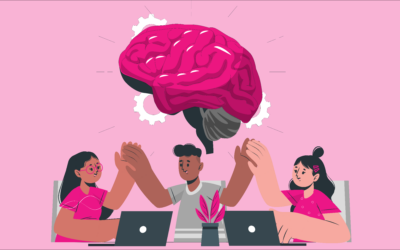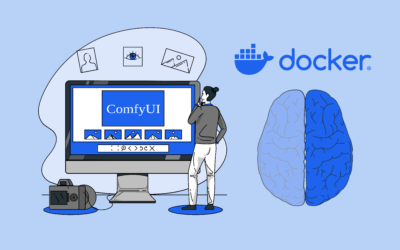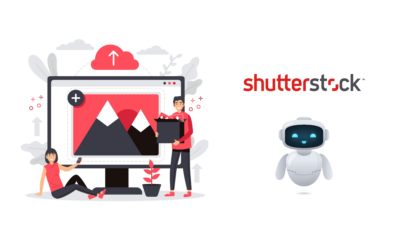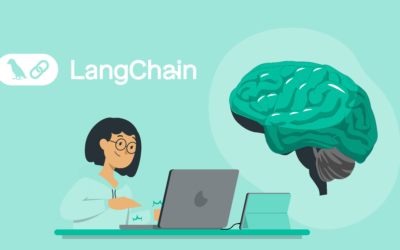Table Of Content
- What is Azure AI Studio?
- Build your Copilots with Azure AI Studio
- Azure AI–Using the Microsoft Infrastructure
- Build and Train Custom Models with Microsoft Azure AI Studio
- Azure AI Studio and Multimodal Models
- Fine-Tuning Versus Retrieval-Augmented
- Prompt Flow in Azure AI Studio
- Benchmark Models
- Model as a Service
- Azure AI Studio and Coding Tools
- Customer Copyright Commitment
- Generative App Development with Krasamo
Businesses undergoing digital transformation and entering the AI era find many opportunities to invest in AI business cases, driving positive economic impact in their organizations.
Generative AI applications are the next wave of innovation. They can transform and create economic value by creating new revenue streams, increasing workplace productivity, modernizing internal processes, and improving customer experiences.
Modern organizations prioritize investments in AI and realize significant returns on their investments. We are experiencing the best “timing” for building and deploying generative AI applications.
Microsoft products like Azure AI Studio and Copilot Studio are significant advancements in the generative AI landscape.
In the following sections, we will explore Azure AI Studio and some of its concepts—a product that simplifies and expedites the AI transformation journey.
Krasamo is a software development company with mobile, IoT, and AI applications expertise. We partner with organizations to build and deploy generative AI applications that maximize existing products and create new solutions.
What is Azure AI Studio?
Azure AI Studio is a groundbreaking platform designed to revolutionize developers’ engagement with and deployment of artificial intelligence in their projects. It is a centralized hub that unites various AI services and tools, offering a cohesive and integrated experience for working with AI technologies.
Azure AI Studio combines multiple AI services into a singular experience. It integrates data and search technologies, foundation models developed in partnership with OpenAI, and a broad selection of open-source and commercial models.
This integration facilitates the creation of custom AI solutions, including copilots, by securely and responsibly leveraging these technologies.
The platform is designed to support the entire development lifecycle of AI applications. It addresses the emerging convergence of DevOps, MLOps, and LLMOps processes (new), offering tools and functionalities that aid in building, scaling, and managing AI systems over time. This includes version control, scaling solutions, and ensuring the AI models are up-to-date.
Azure AI Studio simplifies building powerful copilots, similar to those in Bing Chat, M365, and GitHub (built on Azure). It provides a project-based approach where users can manage AI-related assets, computing, and infrastructure required for their projects.
This includes connecting to Azure OpenAI, Azure Machine Learning, and Azure AI Search, among others.
A unique feature within Azure AI Studio is the ‘Project Playground,’ which allows developers to experiment and prototype with AI models. This space enables users to test models with their data, fine-tune models for specific needs, and evaluate the performance and outputs of these models in a controlled environment.
Azure AI Studio strongly emphasizes safe and responsible AI development. It incorporates cutting-edge safety tools used within Microsoft to ensure that AI solutions are developed with ethical considerations and safety in mind.
The platform supports seamlessly integrating various data sources and AI models into projects. It allows for the management of deployments, providing a comprehensive view of the infrastructure and resources utilized by the projects. This facilitates a smooth transition from prototype to production.
Azure AI Studio represents a significant step forward in democratizing AI development. It makes it more accessible to developers by providing a unified platform that combines the best of Microsoft’s AI technologies and services.
Its emphasis on the full development lifecycle, responsible AI practices, and ease of building and deploying AI solutions positions Azure AI Studio as a valuable tool for any organization or developer looking to leverage AI in their applications.
Build your Copilots with Azure AI Studio
Building your conversational agents (copilots) using Azure AI offers a pathway to harnessing advanced AI capabilities tailored to specific business needs, with the assurance of privacy, security, and responsible AI practices. Some of its core benefits are the following:
- Customization to Specific Needs: Azure AI allows the creation of custom copilots tailored to businesses’ unique requirements, enabling personalized customer and employee experiences. This customization extends to generating content across applications, designing contextual interactions, and optimizing workflows to focus on high-value tasks.
- State-of-the-Art and Open-Source Models: Azure AI Studio is a comprehensive platform that integrates the latest AI models, including those from OpenAI and a wide range of open-source options. This integration facilitates the development of sophisticated AI solutions that leverage the best available technologies.
- Data Integration and Privacy: The platform ensures that AI responses are grounded in the organization’s data, strongly emphasizing data privacy and security. This is crucial for businesses that handle sensitive information and require assurance that their AI implementations are safe and compliant with data protection standards.
- Multimodal Interactions: Azure AI supports the development of multimodal AI applications, allowing for interactions beyond text, including images and voice. This capability enables the creation of more natural and engaging user experiences.
- Foundation of Trust: Building on Azure AI includes a commitment to responsible AI practices, ensuring that applications are developed with ethical considerations and safety in mind. This foundation of trust is essential for businesses aiming to deploy AI solutions that align with their values and ethical standards.
- Rapid Development and Deployment: Azure AI Studio facilitates the quick creation and deployment of copilots, accelerating the time to market for AI-powered features and applications. Azure’s robust infrastructure and AI tools support this rapid development process, making it easier for businesses to innovate and stay competitive.
- Leverage Microsoft’s AI Expertise: Utilizing Azure AI to build copilots allows organizations to benefit from Microsoft’s extensive experience in AI development and deployment. This includes access to advanced tools, best practices, and a secure and scalable cloud platform.
Azure AI–Using the Microsoft Infrastructure
Working with Microsoft products has benefits when creating and deploying AI copilots. The common infrastructure (copilot stack) has layers for building copilots from scratch. Microsoft provides a robust, scalable, and efficient foundation for building AI solutions.
The uniformity of its infrastructure simplifies the integration and deployment processes, making it easier for organizations to leverage AI technologies consistently. Azure AI Studio supports the complete development lifecycle of AI Applications.
This encompasses everything from building and prototyping to scaling and managing AI solutions, ensuring developers have the necessary tools at every stage.
The infrastructure facilitates seamless integration with various data sources, enabling the development of AI solutions that are deeply integrated with the organization’s data ecosystem–crucial for building AI models that are both effective and relevant to specific business needs.
Building with Azure AI Studio gives you computing power, infrastructure, and connectivity with API endpoints, Azure OpenAI, Azure Machine Learning, Azure AI Search, Azure OpenAI Service, and OneLake. Azure AI facilitates all LLMOps tasks (connecting data, prompting, evaluation, model selection, vector support, etc.)
A unified platform designed to scale, accommodating the needs of businesses as they grow. This scalability is matched with efficiency, ensuring that resources are optimized and costs are controlled. It also enables the creation of custom copilots tailored to the specific needs of businesses and their customers.
The tools and principles for safe and responsible AI development, together with privacy of information are critical for building trust and ensuring AI solutions align with organizational values and societal norms.
Organizations can speed up developing and deploying custom AI copilots by leveraging the common layers and tools within the Copilot Stack. Azure AI provides infrastructure support to AI models. This accelerates innovation and allows businesses to respond quickly to emerging opportunities or challenges.
Build and Train Custom Models with Microsoft Azure AI Studio
Azure AI Studio allows you to build stand-alone and Microsoft Copilots. Leveraging Azure’s generative AI capabilities, you can simplify app development by designing and training your copilot to understand and generate human-like responses.
Azure AI is a state-of-the-art platform that supports creating custom copilots, customer service solutions, search functionality, developing bots, tailoring applications, and any combination.
The platform allows the integration of pre-built models and services, navigating the complexities of prompt engineering, retrieving augmented generation patterns (RAG), and integrating with data and cloud services.
Developers can base models on enterprise data and integrate them with Microsoft Fabric (data platform), a multi-cloud data lake. You can ground the model to Azure AI Search or anchor its responses with real-world data knowledge. Azure has strong data protection and does not use your company data to train foundation models.
Azure AI allows the integration of foundation models into their applications as API endpoints and fine-tune models. Grounding the data can involve integrating the model with databases, knowledge graphs, and specific datasets as the foundation for its inferences, predictions, or decisions. Connect your data source.
Access Azure OpenAI On Your company data through the REST API, SDK, or web-based interface in the Azure OpenAI Studio. You can connect your data through a web app and enable a chat solution or deploy it directly as a Copilot Studio.
The model must undergo training using company-specific data to enhance search accuracy and support fine-tuning. This involves incorporating data into OneLake and creating a vector index, which maps various forms of data, such as text and images, into vectors.
Additionally, Azure AI Studio offers a range of prompts that can be directly utilized within applications to facilitate this integration. This approach ensures that searches are more precise and that the AI model is finely tuned to the company’s unique requirements.
LLMOps focuses on integrating data, refining prompt engineering, conducting evaluations, and selecting the most appropriate models for specific tasks. Azure AI enhances this process with connectors designed to streamline the integration of data sources into the models. These connectors are versatile, accommodating structured and unstructured data and sourcing data from various environments, including public clouds and on-premise sources.
Azure AI Search offers robust vector support and facilitates seamless interactions with other technologies to ensure high-quality data is fed into Large Language Models (LLMs). Leveraging diverse vectors, semantic analysis, and keyword searches guarantees enhanced performance and accuracy in search index results.
Advanced hybrid search functionality (vector, semantic, and keyword) allows a more effective understanding of user intent, context, and meaning behind queries than traditional keyword search alone.
Azure AI Studio’s model catalog offers many choices, including OpenAI models like GPT-4, GPT-3.5, Turbo, GPT-4 Turbo with Vision, DALL·E 3, and various open models. It provides the flexibility to combine these models within a single application.
Furthermore, Azure AI Studio enables the integration of models from partners such as Hugging Face (Stable Diffusion), Falcon, and Meta (Llama 2) through API access, enhancing the capabilities of your generative AI (GenAI) application.
Azure AI Studio and Multimodal Models
Multimodality refers to systems or models that can understand, interpret, and generate information across multiple data inputs and outputs, such as text, images, and video.
This allows for more comprehensive and nuanced interactions with technology, as it can process and respond to questions about video and images. Azure AI can work with GPT-4 GPT-4 Turbo with Vision and DALL·E 3.
Azure AI has the capability to handle various types of data to provide more robust and context-aware AI solutions. For example, an AI service that can analyze text and images to generate responses or make predictions would be considered multimodal.
This enhances the AI’s ability to understand and interact with the world in a way that more closely mirrors human cognitive abilities.
Fine-Tuning Versus Retrieval-Augmented
Azure AI Studio offers retrieval augmented and fine-tuning as complementary technologies.
They address different aspects of enhancing AI model performance and applicability. In dynamic environments where information changes rapidly, RAG ensures that the model remains relevant by accessing the most current data. On the other hand, fine-tuning ensures that the model’s responses are appropriately tailored, making them more accurate and useful.
Azure OpenAI enables you to run AI models on your enterprise data without training or fine-tuning them.
Retrieval Augmented Generation (RAG) refers to a methodology where a model retrieves information from a database or corpus to generate responses (responses grounded on data). This approach combines the power of retrieval-based models (which find relevant information from a dataset) with generative models (which can produce text or other outputs based on the input they receive). RAG allows models to pull in relevant external knowledge to enhance the quality and relevance of their outputs. Retrieval augmented generation is a great way to add knowledge to a model and can be developed quickly and inexpensively.
Fine-tuning is a process where a pre-trained model (trained on a large, general dataset) is further trained on a smaller, domain-specific dataset to adapt its responses or predictions more closely to the specific needs of a task or application. This technique leverages the broad understanding the model has gained during pre-training, focusing its capabilities on performing well for tasks within a narrower scope. It is a good method for adjusting the tone and format of output. It adjusts the weights with the base model using Low-rank adaptation technology.
Azure AI Studio allows you to customize models for certain scenarios with your terminology (data) and offers a fine-tuning managed service. You can change parameters and datasets for experimentation and select the right model for the job. Learn more about when to use Azure OpenAI fine-tuning.
Prompt Flow in Azure AI Studio
Prompt Flow is an innovative development tool within Azure AI Studio designed to optimize the entire lifecycle of AI applications powered by large language models (LLMs). This feature simplifies the complexities of prototyping, experimenting, iterating, and deploying AI applications, providing developers with a streamlined process for creating sophisticated AI-driven solutions.
At its core, Prompt Flow enables developers to generate, customize, and execute flows—an executable instruction set that implements AI logic. This is achieved through a visualized graph, allowing for the orchestration of LLMs, prompts, and various tools, including Python, to execute specific AI tasks efficiently.
One of the standout features of Prompt Flow is its ability to facilitate prompt engineering with agility. Developers can interactively author and visualize the structure of flows, create variants for prompt tuning, and evaluate the effectiveness of these prompts and flows. This is particularly useful given the non-deterministic nature of LLMs, where even minor changes can significantly impact application performance.
Moreover, Prompt Flow has comprehensive resources, including tools, samples, and templates. These resources serve as a foundation for development, inspiring creativity and accelerating the creation process. Prompt Flow offers collaborative features for teams, allowing multiple users to collaborate on projects, share insights, and maintain version control seamlessly.
Azure AI Studio’s Prompt Flow also emphasizes enterprise readiness. It streamlines the prompt engineering process from development to deployment and monitoring. Deployments as Azure AI endpoints enable real-time performance tracking and continuous improvement, ensuring applications operate optimally.
Prompt Flow in Azure AI Studio represents a leap forward in prompt engineering, offering a robust platform for developing, evaluating, and deploying LLM-based applications. Its integration with Azure Machine Learning Studio further underscores its significance as a pivotal tool for AI developers seeking to leverage the full power of Azure AI.
For an in-depth exploration of Prompt Flow, including its benefits, development lifecycle, and types of flows, visit click here.
Benchmark Models
Azure AI Studio’s model benchmarking system offers a comprehensive platform for developers and businesses to evaluate and compare the performance of various AI models across industry-standard datasets and tasks. This system is instrumental in guiding users to select the most appropriate models for their specific business scenarios based on empirical data and performance metrics.
By leveraging Azure AI Studio’s model benchmarking system, developers and businesses can confidently navigate the complex landscape of AI model selection, ensuring that they deploy accurate, coherent, fluent, and semantically similar to human language models.
Key Benefits:
- Informed Decision Making: By providing a curated list of the best-performing models for given tasks, Azure AI Studio enables users to make data-driven decisions about which models will likely offer the best outcomes for their particular use cases.
- Accuracy Metrics: The system focuses on accuracy as a primary benchmark, offering detailed insights into how well models perform on specific datasets. This includes the average accuracy across all examples in a dataset and model-level accuracies, facilitating a granular understanding of model performance.
- Comprehensive Evaluation: Beyond accuracy, the benchmarking system evaluates models on coherence, fluency, and GPTSimilarity, providing a well-rounded assessment of a model’s capabilities in producing natural, human-like language that adheres to grammatical rules and closely matches the semantic context of ground truth sentences.
- Regular Updates: Azure AI Studio continuously updates its benchmarking metrics and datasets and introduces new models to the catalog. This ensures users can access the latest information and technology for their AI initiatives.
- Ease of Comparison: With options for both list and dashboard views, the system offers user-friendly interfaces for comparing model performances. Users can easily filter, select, and compare models side by side, assessing their scores across different metrics to identify the best fit for their projects.
Model as a Service
Model as a Service is a novel offering by Azure AI designed to significantly simplify the deployment and utilization of AI models for developers and businesses. This service eliminates the need for users to manage infrastructure, quotas, or the complexities associated with deploying AI models. Instead, it provides a streamlined, pay-as-you-go service where users can access models through an API call, making the model ready for use without the overhead of infrastructure management.
Key aspects of Model as a Service include
- Ease of Use and Accessibility: Users can deploy models easily through a managed service, sidestepping the need to handle infrastructure or manage quotas. This lowers the barrier to entry for utilizing advanced AI models in applications.
- Customization and Fine-Tuning: Model as a Service also supports fine-tuning for those who need to customize models to fit specific needs—such as incorporating particular medical or legal terminology. This managed service requires only the user’s dataset and an API call, simplifying the process of adapting models to bespoke requirements.
- Pay-as-You-Go Flexibility: This model offers a flexible pay-as-you-go approach, allowing users to scale their use of AI models according to their needs and budget without the upfront investment in infrastructure.
- Direct Integration into Applications: The service is designed to be directly integrated into user applications, providing a seamless way to enhance apps with AI capabilities without significant development overhead.
Model as a Service represents a significant step forward in democratizing access to AI, making it easier for developers and businesses to incorporate AI into their solutions while focusing on innovation rather than infrastructure management.
Azure AI Studio and Coding Tools
Azure AI Studio integrates various tools to provide developers a code-centric experience, ensuring a seamless and efficient coding experience.
1. Visual Studio Code (VS Code):
VS Code is a popular lightweight code editor that offers a rich ecosystem of extensions and integrations. You can use VS Code to:
- Write, edit, and debug code seamlessly.
- Access extensions specific to AI development.
- Collaborate with other developers using Git and version control.
- Leverage VS Code’s familiar interface and productivity features while working on AI projects within Azure AI Studio.
GitHub Codespaces provides cloud-based development environments directly within your browser or VS Code. GitHub Codespaces allows you to:
- Set up a consistent development environment across teams.
- Collaborate on AI projects with ease.
- Access your code and tools from anywhere without a local setup.
- Leverage the power of VS Code extensions even in the cloud.
3. Semantic Kernel:
Semantic Kernel is an open-source tool that enhances code editing experiences by providing a semantic understanding of code. Semantic Kernel enables:
- Intelligent code completion.
- Context-aware suggestions.
- Enhanced code navigation.
- Improved code quality and readability.
LangChain is another powerful tool that facilitates language model development and orchestration. Its a language model application development library. LangChain allows you to:
- Build custom language models.
- Fine-tune existing models.
- Create prompt flows for dynamic interactions.
- Evaluate and refine model responses.
Customer Copyright Commitment
The Customer Copyright Commitment, as detailed by Microsoft, is a significant initiative to address the concerns surrounding intellectual property (IP) infringement liability when using the outputs generated by Microsoft’s AI-powered Copilots and Azure OpenAI Service.
The Customer Copyright Commitment is Microsoft’s pledge to shoulder the copyright liability of using AI-powered services. This ensures that customers can leverage these transformative tools without worrying about the legal risks associated with IP infringement.
This initiative is part of Microsoft’s broader effort to advance AI technology responsibly while addressing its challenges and concerns, especially regarding the protection of creative works and the responsible use of AI.
Generative App Development with Krasamo
Investing in building AI capabilities within your organization is critical. AI adoption requires a testing and learning approach and agile development processes.
Simplify and expedite your AI transformation journey with Azure AI and Krasamo AI Development Services. Contact Krasamo to discuss your use cases and how to build generative AI applications.












I applaud Azure AI Studio’s comprehensive approach to generative AI development services, offering a robust platform for informed decision making.